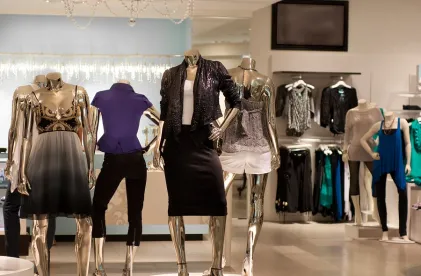In a recent decision under Unfair Competition Law (UCL), False Advertising Law (FAL), and Consumers Legal Remedies Act (CLRA), a California appellate court held that, in at least some circumstances, a consumer who knows the true facts at the time of purchase may nonetheless challenge the retailer’s marketing of the product as deceptive. In so holding, the court departed from several decades of California precedent and endorsed a “momentum to buy” theory under which a customer may complete the transaction and later sue for the amount allegedly paid because of the time and emotion invested in the purchasing process. Brick-and-mortar stores, in particular, should take notice as the decision may affect the way they advertise and entice consumers to shop in their stores. Although the defendant in the case has sought review in the California Supreme Court, unless and until the Court of Appeal’s decision is set aside, it remains a source of serious concern for California retailers.
Background
Since the UCL and FAL were reformed by a voter initiative in 2004, plaintiffs asserting claims under these statutes are required to plead and to prove their individual standing, i.e., that they lost money or property as a result of the retailer’s alleged unfair competition or false advertising. When the consumer alleges that the retailer made a misleading advertisement, the consumer must show that he or she relied on the allegedly misleading advertisement, and that such reliance was an immediate cause of his or her loss of money or property.
In Veera v. Banana Republic, 6 Cal. App. 5th 907 (2d Dist. 2016), the named plaintiffs contended that they decided to shop in a Banana Republic store after seeing signs in the store’s windows and on the sidewalk outside that said “40 percent off.” The plaintiffs recalled little else about the advertisements and any caveats the store presented. One of the plaintiffs testified that she could not recall whether the signs said anything else, nor did she recall whether there were other signs inside the store. Another plaintiff testified that there were no disclaimers or caveats on the “40 percent off” sign, but he could not recall whether there were any other signs in the store, or if, as Banana Republic contended, store employees were handing out flyers explaining the scope of the sale.
After shopping for a period of time (40 minutes in one case), plaintiffs went to the register to purchase their items, only to be told—prior to completing the transaction—that the items they had selected were not part of the sale. In their depositions, plaintiffs testified to feeling embarrassed by the situation and pressured to resolve it quickly because a long line had built up behind them. Because of the time invested in selecting items to purchase, plaintiffs accordingly purchased some, but not all, of the items they had taken to the register.
Plaintiffs filed a putative class action in Los Angeles Superior Court, alleging violations of the UCL, FAL, and CLRA. The trial court granted Banana Republic’s motion for summary judgment, concluding that plaintiffs had not established the requisite standing. The Court of Appeal reversed, finding that there was a triable issue of fact both on the question of whether plaintiffs had suffered injury and whether that injury had been caused by plaintiffs’ reliance on the “40 percent off” signs.
The “Momentum to Buy” Theory of Reliance
The linchpin of the Court of Appeal’s decision was its novel holding that, in at least some circumstances, a plaintiff can satisfy the reliance requirement of a UCL, FAL, or CLRA claim even if the plaintiff knew all of the true facts—here, the inapplicability of the sale—prior to making his or her purchase. Relying on an unbroken string of California precedent, Banana Republic had argued that because the plaintiffs had known at the time of their transactions that their purchased items were not on sale, they, by definition, could not have relied on the belief that the items were on sale when making those purchases.
The Court of Appeal disagreed, reasoning that the plaintiffs had shown that the “40 percent off” ad was a “substantial factor” in causing their economic injury. Specifically, the ads enticed plaintiffs to enter the store and persuaded them to shop, select items to purchase, and stand in line to make the purchase. That chain of events, the court reasoned, resulted in the plaintiffs’ embarrassment, frustration, and perception of pressure to resolve the situation with as little disruption as possible once they were at the register—which, in turn, resulted in their purchase of a full-price item they otherwise would not have bought.
The Court of Appeal majority justified its holding in part on policy grounds—namely, that any other result would leave in the lurch customers who start shopping in reliance on an allegedly false representation and then learned the truth only once they had invested time and emotion in the purchase, or would be subject to public embarrassment if they backed out of the sale at the checkout counter. Thus retailers must design an advertisement so the consumer is fully aware that the sale applies only to select items.
As the dissenting justice pointed out, however, the Court of Appeal’s holding is inconsistent with over a century of California case law interpreting the reliance element of common-law fraud—which, the California Supreme Court has held, is identical to the reliance element under the UCL and FAL. The result is to weaken the voters’ reform of UCL and FAL, and to expand the scope of all three statutes. As a consequence of the Court of Appeal’s contortion of the reliance element in Veera, later courts confronted with both UCL/FAL and common-law fraud claims will be forced to try to reconcile the divergence Veera has created.
Takeaway
As noted above, Banana Republic has filed a petition for review in the California Supreme Court. Unless that petition is granted and the Court of Appeal’s decision is reversed, the “momentum to buy” theory of reliance will pose problems for retailers on a number of levels. The immediate question is when and in what circumstances does the customer build up enough “momentum” such that a complete disclosure will not suffice to defeat a later claim of reliance?
Although the Veera court did not expressly answer that question, two important lessons may be gleaned from its analysis. First, the court’s momentum analysis placed great weight on the plaintiffs’ testimony that they felt both embarrassed by the at-the-register revelation that their items were not on sale and pressured to keep the checkout line moving. Those factors, however, cannot plausibly be alleged during an online-shopping experience, and thus online retailers should have less difficulty rebutting momentum claims than will brick-and-mortar stores with traditional centralized checkout counters.
Second, the court applied a relatively low bar for what qualifies as a factual dispute sufficient to defeat summary judgment. For example, although Banana Republic introduced evidence that both the easel signs outside its stores and almost all of the signs in its store windows bore caveats as to the scope of the sale, the Court of Appeal placed great weight on the fact that one set of window signs—which were displayed for a period of only three days—did not bear such caveats. That was enough, in the court’s view, to create a factual question for trial. It is unclear, however, that there would have been any claim if the record were clear that all signage stated the specific limitation of the sale.
Because e-commerce vendors should have an easier time proving beyond cavil what advertising was posted to their (and third-party) sites at the time of a plaintiff’s purchase, they may have more success in defeating such claims prior to trial. In any event, all retailers should work to ensure that all of their advertising materials carry appropriate caveats regarding the scope of any sales or promotions being described.




 />i
/>i
